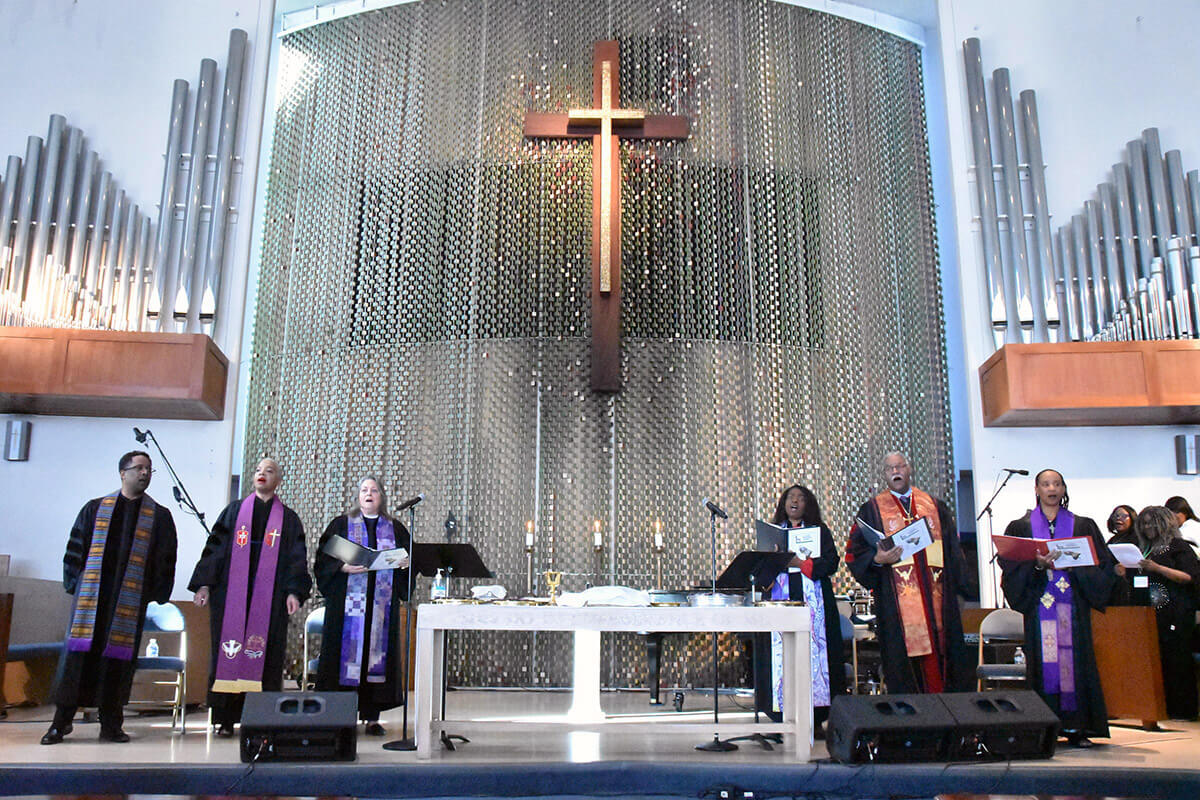Key points:
- Nearly 200 members of Black Methodists for Church Renewal attended the group’s 58th annual meeting at Holman United Methodist Church.
- Members were called to fight for justice and challenge systems of inequality.
- During a panel discussion, Ebony Bishops discussed the state of The United Methodist Church and their hopes for the future.
- Members also heard reports on Africa University, the Black College Fund and the revised Social Principles.
At a time when many United Methodists may feel frustration, fear and fatigue from conflicts in church and society, the denomination’s Black membership caucus heard remedies of hopeful perseverance, bold advocacy and courageous creativity prescribed at its annual gathering, March 19-21.
Nearly 200 members of Black Methodists for Church Renewal attended its 58th General Meeting at Holman United Methodist Church, making a cost-saving decision to meet in a church instead of a hotel. The historic church was an apt meeting site because its longtime pastor, the Rev. James M. Lawson Jr., was a founding member of the caucus in 1968. He led the church from 1974 to 1999 and was still active as Holman’s pastor emeritus when he died in June 2024.
A leader of nonviolent protest and the American Civil Rights Movement, Lawson helped lead BMCR in a walkout during the 1968 General Conference to protest delays in the planned merger that would end the racially segregated Central Jurisdiction and form The United Methodist Church. BMCR successfully called for establishing the Commission on Religion and Race at that legislative gathering to help advance racial desegregation.
Noting ongoing racial inequity today in both the church and society, BMCR Chairperson Deborah Bass lifted the meeting’s timely theme, which began with the caucus’ longtime motto: “Our Time Under God Is Now ... to Inspire, Influence and Impact.”
“The generational fight against racism, oppression and inequality is far from over ... and the cries for justice cannot be ignored,” she said in her address to open the meeting.
Decrying recent actions taken by President Donald Trump’s administration to “dismantle piece by piece our civil liberties and rights,” she cited threats of federal funding cuts to force abandonment of diversity, equity and inclusion policies and practices.
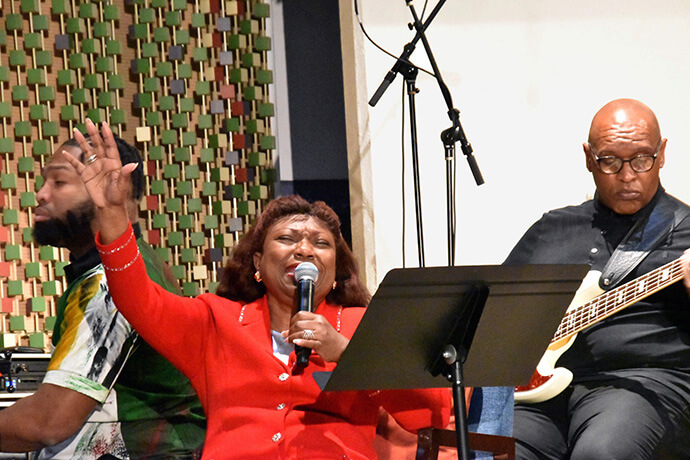
Bass, of Compton, California, called for “perseverance, purpose and justice, as we look to our future as a caucus active in the church and in our communities.” Indeed, the meeting’s scriptural focus was Galatians 6:9: “So let us not grow weary in doing what is right, for we will reap at harvest time, if we do not give up.”
Describing justice as not just a cause but a calling, she said, “It means standing up for the oppressed, speaking truth to power and challenging systems of inequality. We must not give up because our work is not in vain. Justice is coming, and God is with us in the fight.”
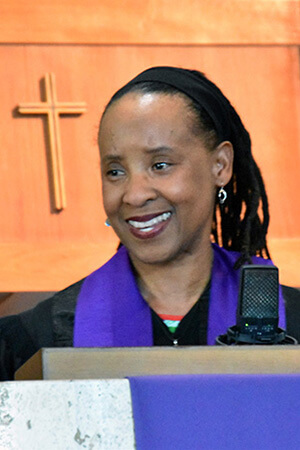
Bishop Kennetha J. Bigham-Tsai, episcopal leader of the Iowa Conference and co-bishop of the Illinois Great Rivers Conference, echoed those sentiments in her opening worship sermon.
“We are now at a time of retrenchment on racial progress and ... are facing racial resentment and attempts at our erasure,” she warned. “Authoritarianism is on the rise, and with it, political and ideological violence and threats against immigrants, people of color and LGBTQ people.”
Remembering triumphs over centuries of slavery, racial discrimination and oppression, she called upon “the inspiration of our resistance and faith to breathe into our folk the spiritual muscle memory we need to run the race marked out for us, keeping our eyes on Jesus.”
She acknowledged that many have lost hope in the church because it has allowed racism, sexism and rejection of the LGBTQ community to “fester within its walls.”
“Now is the time to inspire hope by taking action that matters in people’s lives ... (and) welcoming all people, no matter who they are and who they love,” Bigham-Tsai said.
Bishop Cedrick D. Bridgeforth, who in 2022 became the first openly gay African American man elected a bishop in The United Methodist Church, closed the meeting with a broader social justice message. He opined on mass incarceration and criminalization of teens in the “womb to prison pipeline"; state governments telling mothers “what is legal and acceptable with something growing inside their own bodies"; impediments to affordable housing, living-wage jobs and adequate health care; and efforts to defund federal support for public education.
Bridgeforth, leader of the Greater Northwest Episcopal Area, further warned in his banquet address against oligarchy control of government systems, social media and personal liberties. And he called for new actions to protect human and civil rights that are more strategic, collaborative, “intersectional and underground.”
These two bishops joined two others in an Ebony Bishops panel discussion on “The State of the Church.”
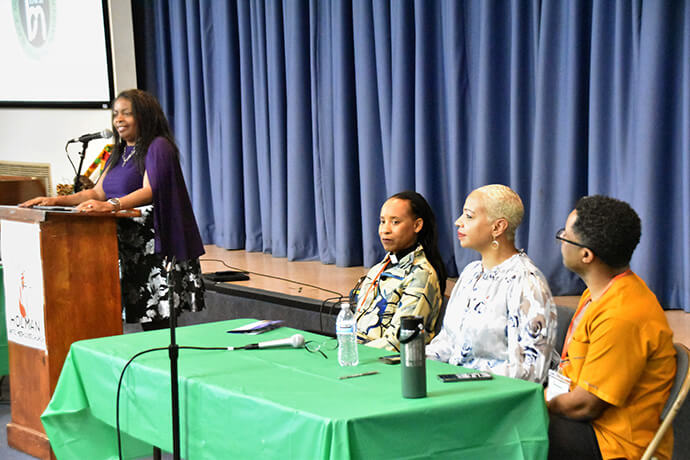
Bishop Tracy S. Malone, leader of the Indiana Episcopal Area and president of the Council of Bishops, heralded the “good news that we are casting a new vision for our beloved denomination.”
She said the vision will be revealed when the Council of Bishops gathers for its spring meeting April 27-May 2 in Chicago.
Malone said that many conversations over the past several years, involving the council and denominational leaders who make up the Connectional Table, have led to “deep, reflective listening” to a broad diversity of voices to help determine new directions for the church.
“The United Methodist Church is in a season of transition, and I believe that God is leading us on a new journey towards renewal, inclusion and a deeper commitment to mission, discipleship and justice,” she told the BMCR caucus. “I believe that God is leading us to become a more honest and authentic church.”
Subscribe to our
e-newsletter
She cited “new realities that are requiring us to ask different, harder questions (and) to reclaim our identity and Wesleyan heritage as a people of discipleship and grace.”
“There is a growing desire for deeper discipleship, for genuine connection, for Spirit-filled transformation,” she said. “And I believe that God is guiding the church to be fully inclusive, with removal of the restrictive language around our LGBTQ+ siblings ... We are embracing a broader vision of God’s kingdom.”
Bishop Cynthia Moore-Koikoi, leader of the Eastern Pennsylvania/Greater New Jersey Episcopal Area, moderated the discussion. She warned of “resistance to change, to going where God would want us to go,” citing the biblical example of Moses’ freed Hebrew people wanting to escape the challenging wilderness and return to slavery in Egypt.
Likewise, Bishop Bigham-Tsai warned of becoming exhausted from doing aspirational, institutional restructuring and then neglecting to do “the deep, relational work that leads to cultural, emotional and spiritual transformation.”
As an example, she pointed to the 2024 General Conference’s approval of a constitutional-amendment package to restructure the global denomination. Under the regionalization legislation, the U.S. and each central conference — church regions in Africa, Europe and the Philippines — would become regional conferences with the same authority to adapt the Book of Discipline, the denomination’s policy book, for more missional effectiveness. To be ratified, the amendment package also will need at least a two-thirds total vote of annual conference lay and clergy voters.
“I hope that annual conferences will approve it,” she said. “That will be a huge step toward decolonizing our churches. However, if that’s all we do, we will not decolonize. We need to do some close examination theologically of how we have been living with folks across the diaspora. And then we need to begin to do our relationships differently.”
She also admonished listeners to “get rid of the scarcity mentality that is taking over the church.”
“Yes, we are shrinking; yes, we are fewer people,” she admitted. “But our mission field has not shrunk. We should be asking questions about the potential impact that we can have through the power of the Holy Spirit.”
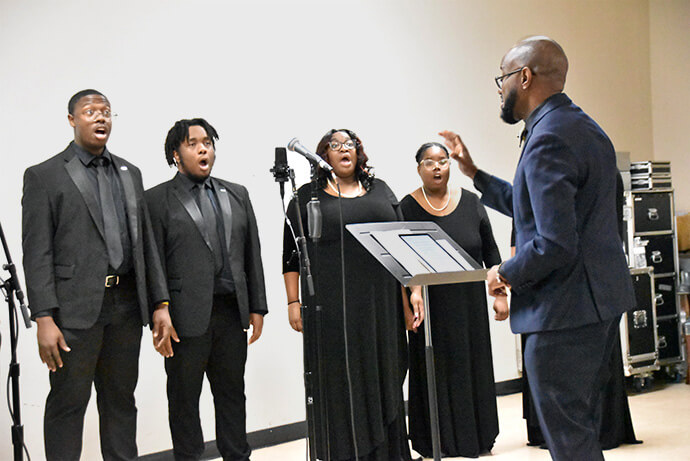
Bishop Bridgeforth illustrated that impact by announcing that while his episcopal area encompasses the Oregon-Idaho, Pacific Northwest and Alaska conferences, it also includes five new ministries among Filipino United Methodists living in British Columbia, Canada. He foresees a “broader horizon” in which the denomination “will be called upon to focus more on communities than on congregations” and on developing and deploying lay leaders more so than ordained clergy leaders.
Bridgeforth cited his own historic episcopal election as evidence that despite its rules and traditions, “the church can change ... if we keep on keeping on ... and trust in God.”
As each bishop shared signs of perceived hope, so did other presenters during the three-day meeting.
BMCR meetings annually feature reports from general church agencies, commissions and institutions, including two United Methodist educational entities it promotes: the Black College Fund and the United Methodist-affiliated Africa University in Mutare, Zimbabwe.
The A Capella Choir of Wiley University, located in Marshall, Texas, performed at BMCR’s 2025 Black College Fund luncheon, helping inspire members to donate over $18,000 to the United Methodist-affilated, historically Black institution. Founded in 1873 by the Freedmen’s Aid Society of the Methodist Episcopal Church, Wiley added graduate programs to become a university in November 2023.
BMCR again welcomed the Rev. Peter Mageto, Africa University vice-chancellor, to update the caucus on the pan-African institution’s progress, challenges and outlook. He reported on increases in students, graduates and programs, including plans to offer new degrees in artificial intelligence, global commerce and mining engineering, and to develop a global online graduate studies campus.
James Salley, president and chief executive officer of Africa University (Tennessee) Inc., added news of a collaboration that will enable a cohort of students at Africa University and United Methodist-affiliated Claflin University in Orangeburg, South Carolina, to receive degrees in biotechnology and climate change in May. Meanwhile, he reported, university board members recently broke ground for a solar energy plant to be built on the campus.
Salley recounted the three-decade history of Africa University for caucus members, many of whom were attending their first general meeting. He pointed to its remarkable growth and impact on both the continent and the denomination, including the recent elections of at least three African bishops who are university alumni.
However, the federal government’s suspension of critical USAID funds in February left a $1.2 million hole in the university’s tight budget, leaving 30 employees unpaid and halting important malaria and tuberculosis research. Mageto and Salley told caucus members efforts were being made to replace and recover needed funds to resume some of the research work.
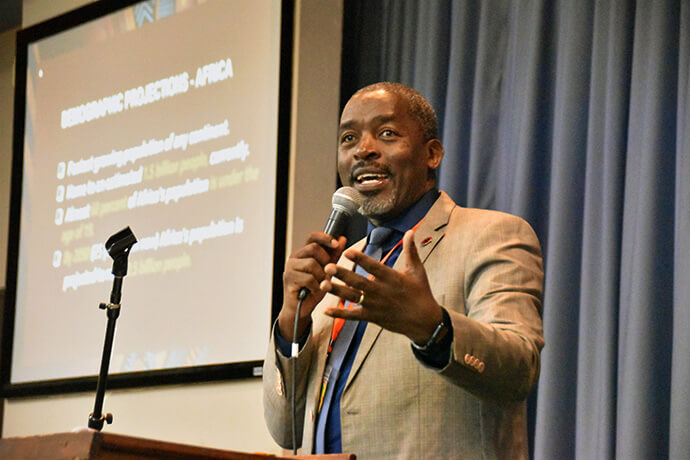
Education to resource caucus members is always a key feature of BMCR general meetings. The two main topics addressed at the March gathering were both of social significance.
The newly revised United Methodist Social Principles, adopted by the 2024 General Conference, took effect in January. Bishop Julius C. Trimble, who leads the United Methodist Board of Church and Society, and the Rev. Camille Henderson-Edwards, who directs its advocacy efforts, presented key highlights and ways to share the updated advocacy resource with congregations.
Meanwhile, in a lecture on social entrepreneurship, the Rev. Joseph Daniels, pastor of Emory Fellowship United Methodist Church in Washington, D.C., shared that church’s experiences and lessons learned in developing high-quality, affordable housing for its neighbors, while renovating its own deteriorating facility. The project, managed by Emory’s affiliated nonprofit, also includes a recreation center, a restaurant and community kitchen, daycare and health facilities, and other community resources.
“Buildings are not monuments to be worshipped. They are assets to bless the community,” Daniels said.
Prioritizing “ministry over money and people over profits” is key, he advised. “We need to think, act and operate like spiritual and social entrepreneurs in order to be relevant and to change the church and the community around us. I believe your community is your congregation.”
Three panelists, including the Rev. Victor Cyrus-Franklin, pastor of Holman United Methodist, shared their social entrepreneurship experiences in developing much-needed affordable housing and other services for people in underserved communities.
BMCR also heard from the Rev. Andre Wilson, pastor of Altadena United Methodist, which was destroyed by wildfires that rampaged through its historic, predominantly Black community in January.
The caucus raised and donated $2,700 onsite to support the church’s recovery efforts. It also passed a resolution from the BMCR board urging local churches, annual conferences, foundations and other entities within The United Methodist Church “to actively participate in and financially support the rebuilding and revitalization efforts of Altadena United Methodist Church.” The resolution calls for creation of a churchwide Advance Special mission funding channel for ongoing support.
BMCR’s 59th General Meeting in 2026 will be in Charlotte, North Carolina.
Coleman is a UM News correspondent and part-time pastor. News media contact: Julie Dwyer, news editor, newsdesk@umnews.org.

